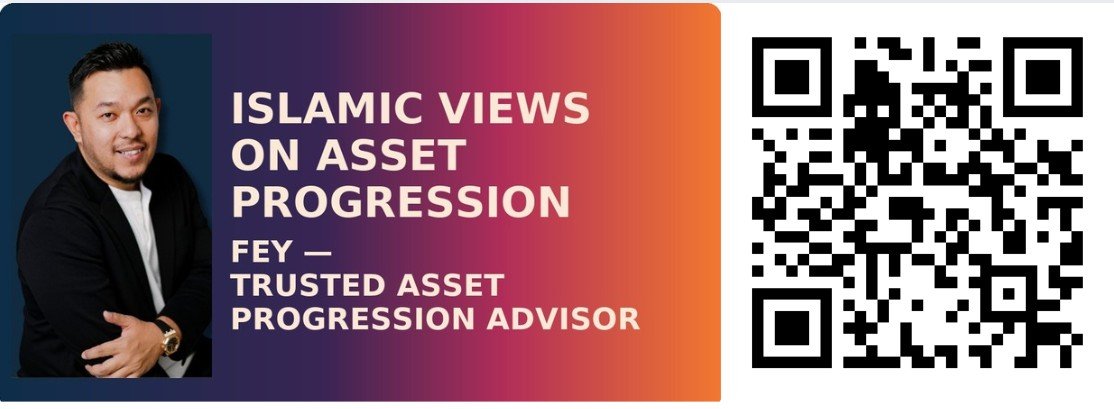The Reality of Property Loans for Muslims
Buying a home in Singapore almost always means taking a loan. For Muslim families, this comes with a difficult truth:
both HDB and bank loans involve interest.
In Islam, riba (interest) is strongly discouraged, but when something becomes a necessity (darurah), scholars allow it, while still reminding us to minimise harm.
MUIS has clarified that taking loans for housing in Singapore falls into this category, as most families cannot realistically buy a home in cash. The key, then, is not avoidance, but minimisation of exposure.
Side by Side: Which Loan Minimises Riba?
Using a $400,000 loan over 25 years, here’s the comparison today (2025):
| Loan Type | Monthly Payment | Total Paid | Total Interest |
|---|---|---|---|
| HDB Loan (2.60%) | $1,814.68 | $544,403 | $144,403 |
| Bank Loan (Fixed 1.63%) | $1,624.29 | $487,288 | $87,288 |
| Bank Loan (Typical 2.40%) | $1,774.39 | $532,317 | $132,317 |
From an Islamic perspective, choosing a bank loan with a lower rate is not about “beating the system” — it’s about reducing your riba footprint across decades.
The Forgotten Factor: CPF Accrued Interest
Even if you use CPF to finance your home, you face another layer of interest:
- The CPF Board requires repayment of both principal and accrued interest (2.5% p.a.) upon sale.
- This means if you used $200,000 CPF, after 15 years you may need to refund over $287,000 (principal + accrued interest).
This too is part of riba exposure, not per say haram by choice, but a system we live within. Again, the Islamic principle is to minimise unnecessary cost where possible.
An Islamic Reminder on Loans
The Prophet ﷺ strongly warned against debt. Yet, Islam also recognises necessity. In such cases, the approach is:
- Fulfil amanah: Pay debts on time. “Delay in payment by a wealthy person is injustice.” (Bukhari 2400, Muslim 1564)
- Minimise harm: Choose the option that results in less interest over time, reducing long-term exposure to riba.
- Seek barakah: Pair wise financial planning with dua, honest dealings, and care for family.
I have spoken to a few scholars, knowledgeable Muslims, and even other real estate agents. Yet it was Mr Fey Firdaus who explained it in the simplest, most impactful way. He reminded me that it doesn’t really matter whether we take the loan from HDB or from a bank — what matters is how we complete the repayment. The longer we take, the more riba we are transacting.
Why Others Opt for Bank Loans
- Lower starting rates: Fixed packages today can go as low as 1.63%.
- Long-term savings: Smaller monthly repayments mean more savings for education, retirement, or even Hajj.
- Refinancing flexibility: You can switch to new packages when rates change.
Such loan alternatives with interest have been offered by banks for more than two decades. Of course, the rates also depend on the volatility of the global economy, but in Singapore they have remained relatively stable.
The trade-off? Bank loans are stricter. Missed payments may mean heavy penalties, unlike HDB’s softer approach.
Conclusion: Faith Meets Finance
In Singapore, Muslim families cannot escape interest in property loans. But they can minimise it, honour their amanah, and protect their family’s future.
This is why having a trusted advisor like Fey Firdaus matters. He explains the differences clearly, helps you plan with both dunya and akhirah in mind, and ensures you make a decision that balances necessity with responsibility.
👉 The Islamic principle is clear: if you must enter riba (due to necssity), reduce its burden. Choose wisely. Plan responsibly. And always fulfil your trust.

Fey – Reno Realtor, A Trusted Asset Progression Advisor
Fey helps families in Singapore upgrade with confidence from HDB to private property using clear numbers, zero pressure, and step by step planning. His approach puts suitability before size, focuses on debt control and long-term value, and aligns with Islamic financial ethics.



1 Comment
haram lah, where riba acceptavble?